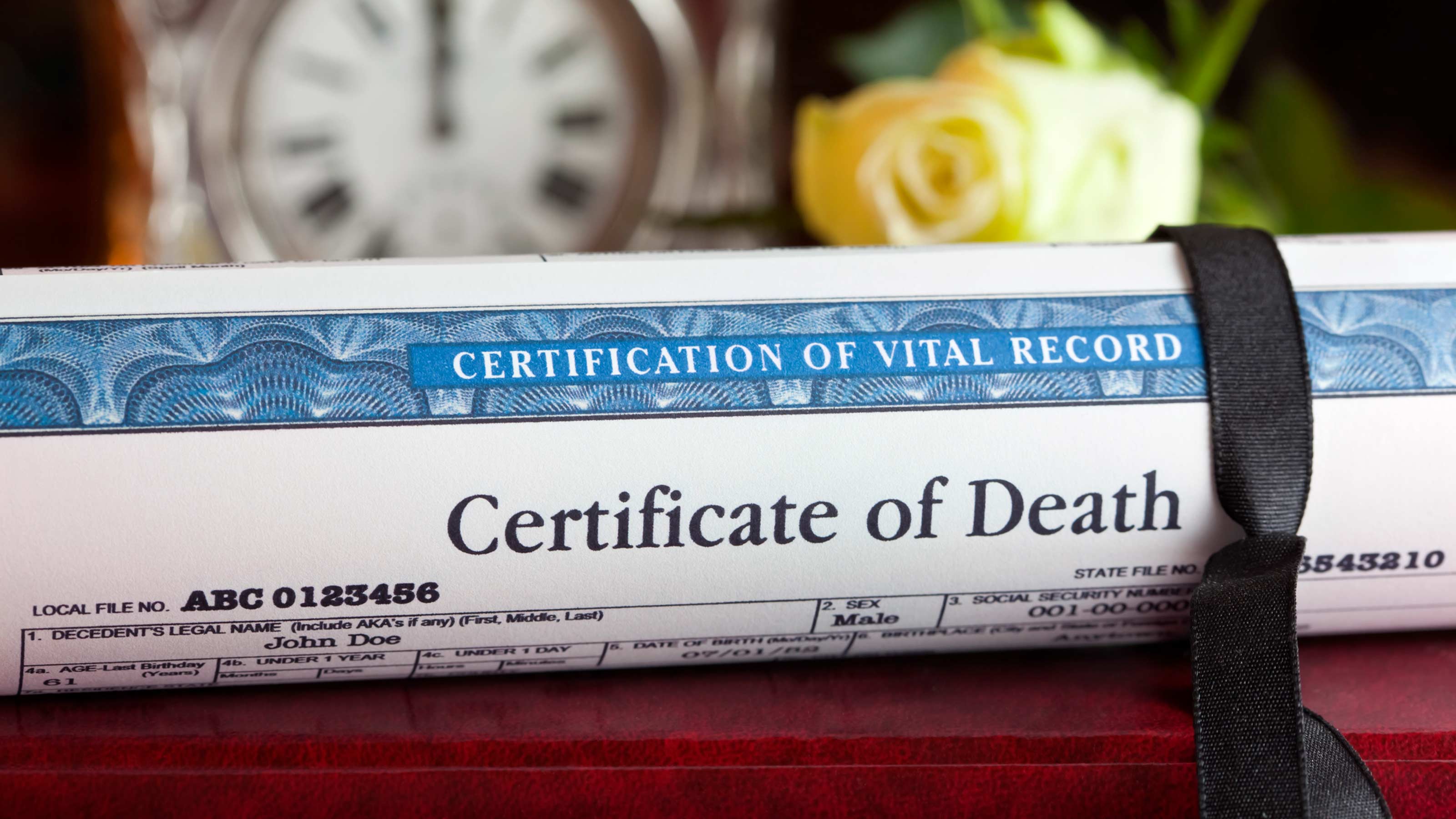Checklist: Steps to Take after Your Spouse Dies
Feeling overwhelmed? A checklist can help you figure out where to start and tasks you may be able to put off.


Profit and prosper with the best of Kiplinger's advice on investing, taxes, retirement, personal finance and much more. Delivered daily. Enter your email in the box and click Sign Me Up.
You are now subscribed
Your newsletter sign-up was successful
Want to add more newsletters?

Delivered daily
Kiplinger Today
Profit and prosper with the best of Kiplinger's advice on investing, taxes, retirement, personal finance and much more delivered daily. Smart money moves start here.

Sent five days a week
Kiplinger A Step Ahead
Get practical help to make better financial decisions in your everyday life, from spending to savings on top deals.

Delivered daily
Kiplinger Closing Bell
Get today's biggest financial and investing headlines delivered to your inbox every day the U.S. stock market is open.

Sent twice a week
Kiplinger Adviser Intel
Financial pros across the country share best practices and fresh tactics to preserve and grow your wealth.

Delivered weekly
Kiplinger Tax Tips
Trim your federal and state tax bills with practical tax-planning and tax-cutting strategies.

Sent twice a week
Kiplinger Retirement Tips
Your twice-a-week guide to planning and enjoying a financially secure and richly rewarding retirement

Sent bimonthly.
Kiplinger Adviser Angle
Insights for advisers, wealth managers and other financial professionals.

Sent twice a week
Kiplinger Investing Weekly
Your twice-a-week roundup of promising stocks, funds, companies and industries you should consider, ones you should avoid, and why.

Sent weekly for six weeks
Kiplinger Invest for Retirement
Your step-by-step six-part series on how to invest for retirement, from devising a successful strategy to exactly which investments to choose.
The death of your spouse is a period of unimaginable grief. Unfortunately, there are many legal and financial obligations that will not wait.
Tackling a to-do list at this time is probably the last thing you want to do, so it is a good idea if you can seek out the help and advice of a trusted family member, friend or adviser to sort things out and provide you with emotional guidance. Here is a checklist to help guide you through the most important tasks you need to complete:
Investment advisory and financial planning services are offered through Summit Financial LLC, an SEC Registered Investment Adviser, 4 Campus Drive, Parsippany, NJ 07054. Tel. 973-285-3600 Fax. 973-285-3666. This material is for your information and guidance and is not intended as legal or tax advice. Clients should make all decisions regarding the tax and legal implications of their investments and plans after consulting with their independent tax or legal advisers. Individual investor portfolios must be constructed based on the individual’s financial resources, investment goals, risk tolerance, investment time horizon, tax situation and other relevant factors. Past performance is not a guarantee of future results. The views and opinions expressed in this article are solely those of the author and should not be attributed to Summit Financial LLC. Links to third-party websites are provided for your convenience and informational purposes only. Summit is not responsible for the information contained on third-party websites. The Summit financial planning design team admitted attorneys and/or CPAs, who act exclusively in a non-representative capacity with respect to Summit’s clients. Neither they nor Summit provide tax or legal advice to clients. Any tax statements contained herein were not intended or written to be used, and cannot be used, for the purpose of avoiding U.S. federal, state or local taxes.

Don't make any life-changing decisions.
Now is not the time to make any significant, financial decisions. While it is entirely reasonable to want to sell a home or other property that reminds you of your spouse, wait. For some, paying off the mortgage makes sense, while for others maybe not. (For more on that, please see Should a Widow Pay Off Her Mortgage?) Also, avoid making any additional investments or large purchases, especially if you were not actively involved in your family's finances before the death. Give yourself all the time you need to mourn first.

Request certified copies of the death certificate.
You will need certified copies of your spouse's death certificate to prove the passing of your spouse and to claim benefits or to switch over accounts into your name. Ask the funeral home for at least a dozen or more copies. You may also need certified marriage certificates to prove you were married to the deceased.

Speak with your spouse's employer.
If your spouse was working at the time of his or her death, make a point to contact the employer to see if there are any benefits you are entitled to have, including a 401(k) or employer-based insurance policy. If you and your dependents' medical insurance was covered by your spouse's job, make sure you know how long the coverage will last to give yourself time to make other arrangements.

Call your spouse's insurance company and file a claim.
Make sure you have all the documentation in order before contacting the insurance company to avoid frustration and wasted time. Be sure to understand the benefit options, there may be more than one way to claim a life insurance benefit.

Probate your spouse's estate.
First you want to locate the will. Generally, it’s filed with an attorney, or in a safe deposit box. Contact the attorney for a reading and for help in settling the estate. If your spouse died without a will, things could get complicated. Most people can benefit from asking for professional legal and financial advice in this situation.

Gather the financial records.
Start collecting the financial records, including banking records, bills, credit card statements, tax returns, insurance policies, any outstanding mortgages or loans and retirement accounts. If your spouse did not have an organized file system, this might take a long time. You may need to call companies directly and provide proof of your spouse passing before being able to gain access to the accounts.

Switch over accounts and cancel credit cards.
If your spouse was the sole name on an account, such as a utility, or a subscription service, such as a mobile phone, make sure to change the name if you want to keep the service, or terminate the account if you don’t. Get a copy of your spouse’s credit reports so you’re aware of all debts in your spouse’s name. (The three major credit bureaus are Equifax, Experian and TransUnion.)
Ask to have a notification in the credit report that says “Deceased — do not issue credit,” so new credit is isn't taken out in their name. As a surviving spouse, you may not be responsible for the payment of credit card accounts held by your spouse alone, and many credit card companies will write off the debt owed to them. However, the laws differ in community property states, such as Arizona, California, Idaho, Louisiana, Nevada, New Mexico, Texas, Washington and Wisconsin. Here the surviving spouse may be responsible for the credit card debt. A local attorney can help.

Contact government offices.
Have your spouse's Social Security number handy and call the Social Security Administration office to find out what you need to do to receive survivor benefits. Doing this as soon as possible can help prevent long delays before you get your next Social Security payment, and you may even qualify for a one-time death benefit of $255. If your spouse served in the armed forces, you might be eligible for additional benefits from the Department of Veterans Affairs, so contact your local branch office.

Switch emergency contact information.
Change any of your or your family members' emergency contact information that had your spouse's name or number listed as someone else's primary point of contact.
When you lose a loved one, your world is turned upside down. On top of all the grief there are the financial issues that land in your lap. While I would not recommend rushing any major money decisions, some issues just cannot wait. A checklist is a good way to help with the immediate tasks. However, I recommend a financial plan to help with the larger issues, like planning for retirement or evaluating Social Security claiming strategies. If you are uncomfortable handling the financial responsibilities or need a second opinion, an experienced fee-only financial adviser can help.
For more financial planning insights for Widows and Widowers, please visit my website at www.survivorplanning.com.
Profit and prosper with the best of Kiplinger's advice on investing, taxes, retirement, personal finance and much more. Delivered daily. Enter your email in the box and click Sign Me Up.

Michael Aloi is a CERTIFIED FINANCIAL PLANNER™ Practitioner and Accredited Wealth Management Advisor℠ with Summit Financial, LLC. With 21 years of experience, Michael specializes in working with executives, professionals and retirees. Since he joined Summit Financial, LLC, Michael has built a process that emphasizes the integration of various facets of financial planning. Supported by a team of in-house estate and income tax specialists, Michael offers his clients coordinated solutions to scattered problems.
-
 5 Vince Lombardi Quotes Retirees Should Live By
5 Vince Lombardi Quotes Retirees Should Live ByThe iconic football coach's philosophy can help retirees win at the game of life.
-
 The $200,000 Olympic 'Pension' is a Retirement Game-Changer for Team USA
The $200,000 Olympic 'Pension' is a Retirement Game-Changer for Team USAThe donation by financier Ross Stevens is meant to be a "retirement program" for Team USA Olympic and Paralympic athletes.
-
 10 Cheapest Places to Live in Colorado
10 Cheapest Places to Live in ColoradoProperty Tax Looking for a cozy cabin near the slopes? These Colorado counties combine reasonable house prices with the state's lowest property tax bills.
-
 Don't Bury Your Kids in Taxes: How to Position Your Investments to Help Create More Wealth for Them
Don't Bury Your Kids in Taxes: How to Position Your Investments to Help Create More Wealth for ThemTo minimize your heirs' tax burden, focus on aligning your investment account types and assets with your estate plan, and pay attention to the impact of RMDs.
-
 Are You 'Too Old' to Benefit From an Annuity?
Are You 'Too Old' to Benefit From an Annuity?Probably not, even if you're in your 70s or 80s, but it depends on your circumstances and the kind of annuity you're considering.
-
 In Your 50s and Seeing Retirement in the Distance? What You Do Now Can Make a Significant Impact
In Your 50s and Seeing Retirement in the Distance? What You Do Now Can Make a Significant ImpactThis is the perfect time to assess whether your retirement planning is on track and determine what steps you need to take if it's not.
-
 Your Retirement Isn't Set in Stone, But It Can Be a Work of Art
Your Retirement Isn't Set in Stone, But It Can Be a Work of ArtSetting and forgetting your retirement plan will make it hard to cope with life's challenges. Instead, consider redrawing and refining your plan as you go.
-
 The Bear Market Protocol: 3 Strategies to Consider in a Down Market
The Bear Market Protocol: 3 Strategies to Consider in a Down MarketThe Bear Market Protocol: 3 Strategies for a Down Market From buying the dip to strategic Roth conversions, there are several ways to use a bear market to your advantage — once you get over the fear factor.
-
 For the 2% Club, the Guardrails Approach and the 4% Rule Do Not Work: Here's What Works Instead
For the 2% Club, the Guardrails Approach and the 4% Rule Do Not Work: Here's What Works InsteadFor retirees with a pension, traditional withdrawal rules could be too restrictive. You need a tailored income plan that is much more flexible and realistic.
-
 Retiring Next Year? Now Is the Time to Start Designing What Your Retirement Will Look Like
Retiring Next Year? Now Is the Time to Start Designing What Your Retirement Will Look LikeThis is when you should be shifting your focus from growing your portfolio to designing an income and tax strategy that aligns your resources with your purpose.
-
 I'm a Financial Planner: This Layered Approach for Your Retirement Money Can Help Lower Your Stress
I'm a Financial Planner: This Layered Approach for Your Retirement Money Can Help Lower Your StressTo be confident about retirement, consider building a safety net by dividing assets into distinct layers and establishing a regular review process. Here's how.
